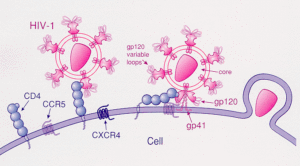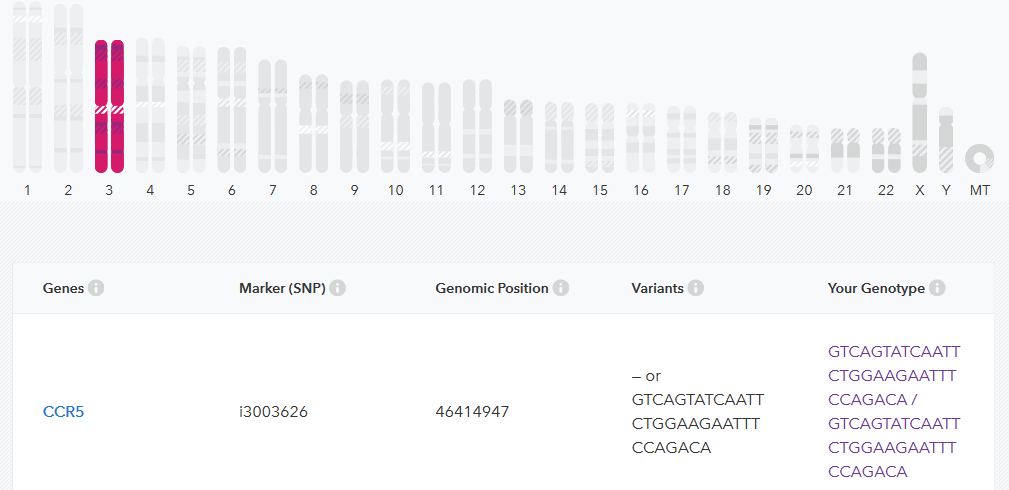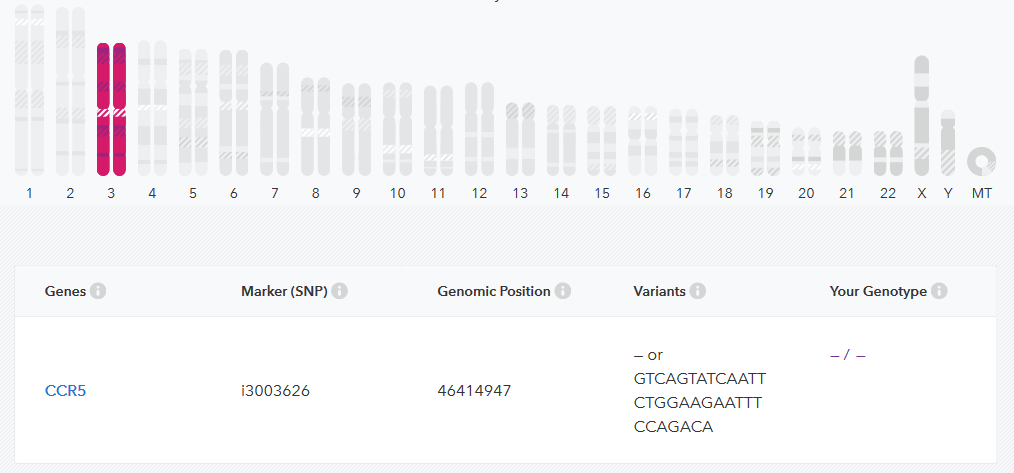There is a gene called CCR5 that can have a variation that prevents AIDS. You need to have two copies, one from each parent, to be immune to AIDS. If you have only one copy, your resistance is increased. The current theory is that this mutation became prevalent in Europeans after the ravages of smallpox or perhaps the Black Death and was selected for, since it is presumed protective against those diseases. It is more frequent in Northern Europe than Southern, but is found as far south as North Africa.

from wikipedia – By US National Institutes of Health – National Institute of Allergy and Infectious Diseases – US National Institutes of Health – National Institute of Allergy and Infectious Diseases, Public Domain, Link
The down side is that this CCR5 change may increase your risk of an abdominal aortic aneurysm and put you at risk for complications from various viruses like West Nile or tick born encephaliitis. Wikipedia has an excellent and detailed article about CCR5 here.
This AIDs protective variation is actually the loss of 32 alleles (so it is called delta 32) on chromosome 3 at location 46414947.
It is that change that the Genetics researcher He Jiankui claims to have made on two embryos in China using CRISPR technology which has caused such an uproar around the world. Click here for the NPR article about that which mentions that their father is HIV positive.
If you have tested your DNA at 23andme, you can check your own CCR5 for the delta 32 variation which is known as i3003626 there. Here’s how
Click on your name or image on the top left of any page at 23andme to get a drop down menu.
Then click on Browse Raw Data in that menu.
On the raw data page type i3003626 into the large box above the chromosome picture then click the enter key.
Here are examples of what you might see.
Some further reading, very technical:
https://www.snpedia.com/index.php/Rs333





Interesting. I didn’t do the 23andMe health test but uploaded my results to Promethease. My results said that while I’m not immune to HIV I have greater resistance to AIDS than most other people. I wonder if this is connected. 23andMe does say that I have more Neanderthal DNA than most testers. I read recently that Neanderthals would have had immunities or resistance to HIV.
As far as I can tell from looking at the raw data, only 23andme tests for Delta32 but there are other variants which confer resistance.
Yes Europeans inherited quite a bit of immune system help from Neanderthals but whether Delta32 was included is not known, just speculated on. Here is what we inherited…
https://www.uni-bonn.de/Press-releases/research-team-discovers-201cimmune-gene201d-in-neanderthals
I just did mine through prom as well. 90% reduction. All northern European with most recent ancestors from Sweden.
I had heard about the CCR5 Delta mutation, but it never even occurred to me you could check until I came across this post. I did the raw data check as instructed above and I’m —/— under my genotype. I uploaded my data to Prometheus to double check and it says I have the homozygous Delta 32 variation DD/DD and am HIV resistant.
I think it’s pretty poor on 23&Me and the FDA that, from what I read, this used to be fully disclosed in a health report but now it has to be stumbled upon. 23&Me could provide ample explanation and disclaimers and people can discuss further with their doctors. Happy with the result, but not happy I had to stumble upon the method of discovery.
Blame the FDA who put a muzzle on the 23andme health reporting.
But whenever a new interesting peer reviewed genetic connection is written up, I do go check my raw data at 23andme so I am very grateful that they have that nice browser
yes mike are you willing to become a donor for a possible recipient ? thanks, sincerly.
typo: musicandmore123@yahoo.com
Of course!
The template has been updated to include dominant and recessive traits for ccr5 and now what you see is two “builds” that contain “-/GTCAG.. ” which I assume is a D/R for each copy. I’d like to see the build for extra copy ccr5. Other resistant factors without having the copies are dominant cysteine bases
I agree that the CCR5-delta 32 mutation most likely correlates with the introduction of Neanderthal DNA. Those of Asian and African descent do no have the mutation.
Being that the primary origins of Neanderthals is in the regions of Europe, the two correlate.
I was so surprised to see your post about this. I too have two copies! My ancestors are from Northern Ireland. I tried to research it but found little information other then what you have found. I wonder if having two copies would reveal any genealogy lines. I thought I read one 1 % of the population has 2 copies.
I don’t know that I have 2 copies, but I may have 1 as I’m apparently not immune, but would have a slower progression to AIDS. My father’s ancestors were from Northern Ireland.
I’m Scottish Irish descent I’ve always wondered if I am a carrier of the Delta 32 mutation. I am gay and I was no virgin in the 80s. All my friends died as well as 5 men I slept with. to this day I’m negative. If I do have the mutation can I help people with donating blood?
yes robert if you do have both copies from both of your parents naturally past down if i could ask you i would like too be the first reciepient of your donation thanks, sincerly.
All that can tell you is that each of your parents had at least one copy which is not much help for genealogy.
Isn’t following a genealogy line for AIDS resistant genes really creeping? There are no HIPPA laws protecting anyone.
The invasion of the Vikings means that many of Irish and especially Scottish descent are Scandinavian
So, in the first case:
“No deletes, so no delta 32 in this CCR5”
Does this mean that you are less receptive? Or more?
C –
What is unclear about “This AIDs protective variation is actually the loss of 32 alleles”? Therefore no deletes = no immunity from this particular genetic variation.
This news is on Fox today:
https://www.foxnews.com/health/london-patient-is-second-reported-patient-to-be-cured-of-h-i-v-report
Received a bone marrow transplant to address Hodgkin’s lymphoma. The donor had, you guessed it, both copies of the CCR5 mutation.
I have ccr5 delta-32. I am a gay man 70 years old I have a lover that is HIV positive.
Well that is a lucky mutation for you to have then.
I removed your email address from your post because I like to preserve privacy but if you really want the spam you will get, I can put it back!
The CCR5 delta 32 test on 23 and me result, what package is that result on, is it on the ancestry and health or only non the VIP. I am Northern European stock, my mothers side has been done through an Aunt but not my fathers. I would be interested in dna testing.
My family has been hit badly by cancer, rare forms too, I would certainly be interested in seeing possible markers for this.
Thanks
David,
Only 23andme shows the CCR5. I have not yet evaluated the Ancestr6 or MyHeritage health tests but the raw data from ancestry did not show the CCR5
If your family has been hit hard by cancer then you might talk to your doctor about doing the color genomics test which is specific for various cancer markers but needs doctor supervision. A friend with this same family issue and prostate cancer did that test which found a BRCA2 deletion not shown in his 23andme results.
I hope you know your stuff Kitty! The Ancestry Kit looked like it gave more SNPs for the $99 but I am specifically interested in the CCR5 since it may relate to COVID so I’ll try the 23andMe kit instead. They would not tell me straight out if the raw data still contained this or not so ty. @David, according to Promethease and https://www.snpedia.com/index.php/Testing
The 23andMe $99 “ancestry only” product and the $199 “ancestry + health” raw data is identical. So $99 it is lol.
The nice thing about 23andme is that you can browse the raw data if you are interested in that and yes it is the only company to test for this at the moment.
Kitty i got my results back from prom. But I don’t understand the results Is there any way you can email me and maybe we can get in contact with each other. Send me an email and I will reply
Thank you for posting this easy tutorial! Discovered that I have one deletion (heterozygous). Much gratitude.
Has anyone found that the ancestry raw data can be used?
I am looking to be tested. I had some very surprising test results recently. My husband of 27 years just gave me HIV. His test results indicates that he has had it for 12-18 months. Mine indicated I had it for a few weeks. I only found out because I had the flu really bad with severely swollen lymph nodes in my neck and an extremely swept throat. HIV-1 reactive and confirmed. The next set of tests which were drawn the day before I started meds, Al came back as though I didn’t have HIV, but more like fighting off the flu. The most interesting was the normal CD4 count and no viral load. The doctors are baffled. They said it looks like the virus was unable to infiltrate the CD4 cel’s and my immune system completely killed off the virus since it couldn’t replicate. In the last 18 month I have had these exact flu symptoms so I am thinking my husband keeps giving me HIV and I keep killing it off and we didn’t know because I didn’t know he had cheated/experimented with a man and contracted HIV. I have other mutations so I probably have this one too (homozygous MTHFR, homozygous MC1R, and numerous CYP450 mutations) A negative affect of all the mutations I have is that I have to take high doses of opioids more often than others, when I have to take them. On the plus side, I have no side affects and they don’t make me high. In 2016 Doctors had to give me 30 mg morphine every 2 hours for 6 months.
My sister told me today that she has declared that I am evolution.
EJ – well the 23andme test will show if you have the deletions on the CCR5 gene, sounds like you do. Lucky you!
I got my results and I had no deletions so I was disappointed not to have genetic superpowers but nothing bad showed up either and I enjoyed browsing the data. Thanks for the help! That was the the 23andMe $99 “ancestry only” with the raw data run through promethease.
Hi,
Are you saying that the deletions are shown as “-/-” in the column that says Your Genotype for marker i3003626?
This is all very confusing, and I’m just trying to make sure I understand what you are saying above. Many thanks.
Yes the deletion is shown as a dash as opposed to a bunch of letters
Thank you so much! You explained it perfectly but I just wanted to be sure.
I would like to be immune.
Hey Kitty ,
I used ancestrydna and it says 3003636 AA . What does this mean?
Rob –
Sorry, Ancestry does not give enough information about that location to determine if there is a deletion there or not. Notice that there are many letters shown for 23andme on that location….
Yes, Ancestry does give you enough info.
1. Download your data from Ancestry (Zip file, so unzip)
2. Open the text file in Pages or Excel, or just as a TEXT
3. CTRL + F (To find the gene) type or paste rs333 (Select whole words, this way it will only find exactly “rs333”.
4. Look to the right and you will either II, DI, or DD
The CCR5 gene (chemokine receptor type 5) codes for a protein on the cell membrane.
Base the results off of the guide below.
As for my I had the “DI” so I only have one deletion. Therefore I can get HIV but, it’s less likely and if I do get it then it won’t switch over to AIDS for quite awhile and even then I could survive to a ripe old age. Or whenever this cigarettes kill me
///////////////////////////////////////////////////////////////////////////////////
II +/+: Not resistant to HIV infection; shows average time of progression to AIDS after infection.
DI Delta32/+: Not resistant to HIV infection but may have slower progression to AIDS after infection.
DD Delta32/Delta32: Resistant to infection by the most common strain of HIV people usually encounter, though protection is not complete.
Great, this must be on the newest chip, those of us with older tests do not have this information
I have several rs333… records. which is the one I’m looking for?
For real. I have several as well. Let me know if you find anything out.
I may just find a local lab here in Houston to run it and bite the financial bullet and pay it. It’s driving me crazy not knowing
Since my mother had an abdominal aortic aneurysm (but lived to age 90 without it rupturing), I checked this gene, and discovered that I have one deletion, likely from my mother. Thanks for this post which made finding this so easy.
So, when I search my 23&Me results for i3003626, I het the following (though set out in columns):
Genes: CCR5AS, CCR5
Marker (SNP): i3003626
Genomic Position: 46414947
Variants: — or GTCAGTATCAATTCTGGAAGAATTTCCAGACA
Your Genotype: GTCAGTATCAATTCTGGAAGAATTTCCAGACA / GTCAGTATCAATTCTGGAAGAATTTCCAGACA
Based on the above and other comments, I assume based on my genotype that I do not have the CCR5 Delta 32 mutation at all (either homozygous or heterozygous; despite my 23&Me results being 92% NW European, incl 11% Scandinavian, so I was at least hoping for one!!!).
But, what does the deletion marker under Variants column mean before the “or” followed by a long string of numbers?
And why is the Gene listed not simply as CCR5 as in your example screenshot above, but as “CCR5AS, CCR5”? What does the CCR5AS mean? Not having much luck so far searching.
Appreciate any info anyone has on those questions. Thanks.
Dennis,
The variants show the possible values at that location, the dash standing for a deletion.
Don’t worry about the change in nomenclature, you have the right location and you do not have the variant
Thanks.
I found this about CCR5AS: “Also, there is a recently described long noncoding RNA (lncRNA) gene overlapping with CCR5, termed CCR5AS, whose expression is positively correlated with CCR5 mRNA levels (Kulkarni et al., 2019). This finding is quite relevant due to the impact of noncoding genetic elements on the susceptibility and progression of infectious diseases (Ellwanger, Zambra, Guimarães, & Chies, 2018).”
Seems like more than merely a change in nomenclature. I’d like to find out more about what this actually CCR5AS info means in terms of assessing “susceptibility and progression of infectious diseases” on the individual level in looking at one’s DNA results. Seems there is more involved, perhaps, than just the one i3003626 marker.
“had”. No idea where that “het” typo came from in the first line above.
Hi Dennis, I have exactly the same result as you from my 23andme sample, I’m not sure what it all means, I was hoping you called point me in the right direction. Looking forward to your speedy reply,Kind regards
If you do not have a dash, then you do not have the variant
CCR5AS is antisense and has been shown to increase HIV infection with another variant.
It may be relevant with delta32 and maybe not. Antisense dna interferes with rna replication. It can enhance it or inhibit.
Would be good to see if this has been found to be helpful or not.
I have one delete will this confer protection from smallpox
Sugar, possibly but unnecessary as smallpox has been eliminated from the world see https://www.cdc.gov/smallpox/history/history.html
Stupid question. All three examples appear exactly alike, so how does one determine the deletes? Thanks!
So, yes…pro-tip: turn phone for landscape mode to see “Your Genotype.” LOL.
I’m 99.5% European—93.5% N European—and, alas, have no deletes, but my half-Italian spouse and son have one delete. Yay them. Oh well for me! Not that it’s a particular concern for me.
Thanks!
Good you answered your own question!
I’m not understanding my results should I be looking at the variant row? Mine says – or and then followed by a bunch of letters.
If you have a – and then a bunch of letters, you have one delete as shown in the middle image andd so you are resistant
I’d looked into this some years past and for whatever reason believed I had one copy and was resistant.
Now I find this weekend I have both copies. -/-
I think back, and my thoughts get heavy. This may very well be THE reason I’m still here alive at 64.
So glad for you!
The template has been updated to include dominant and recessive traits for ccr5 and now what you see is two “builds” that contain “-/GTCAG.. ” which I assume is a D/R for each copy. The reason for this is because the deletion mechanism is still carried out by the genetic sequence. If there is an Adenine at the end of the genetic sequence there is likely a respiratory defect. See the pubmed article titled:
Role of adenine nucleotide translocator 1 in mtDNA maintenance by J Kaukonen (2000).
I’d like to see the build for extra copy ccr5. Other resistant factors without having the copies are dominant cysteine bases but, although resistance is seen in Asian communities, cysteine base carrying women were not able to be collected as they are rare and, as stated above, ccr5-32 deletion is not common in Asia.